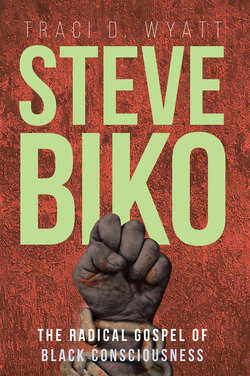Читать книгу Steve Biko - Traci Wyatt - Страница 7
На сайте Литреса книга снята с продажи.
ОглавлениеAcknowledgments
I would like to thank God for helping me to arrive at this milestone in my academic career. A special thank-you to my adviser and dissertation committee chair, Dr. Mbye A. B. Cham, for agreeing to work with me in accomplishing my educational goals. He has cheered me on while being patient, thorough, and keen in directing me so that I could reach every stage of this journey in a timely and successful manner.
To the distinguished scholars of Howard University’s Department of African Studies who make up my committee—Dr. Almaz Zewde, Dr. Alem Hailu, Dr. Cheryl Sanders—thank you for your willingness to serve on my committee and for challenging and supporting me through this process.
There is another exceptional faculty member that I cannot thank enough, and that is Dr. Cheryl Sanders from Howard University’s School of Divinity. You helped breathe life into my dissertation proposal that would have otherwise been shot down. Your expertise in Christian ethics and theology eased the tensions of seeing the Christian side of Steve Biko’s life. Dr. Benjamin Arah, my external reviewer from Bowie State University, thank you for challenging and encouraging me simultaneously during the oral defense.
Graciously and from the bottom of my heart, I send an exceptional thank you to my mentor who has walked with me from day one of my collegiate journey, Dr. Segun Gbadegesin. You believed in me and saw potential when I did not believe in myself. Thank you!
My supervisor, Dr. Daniel Williams, has been absolutely amazing in supporting my academic endeavors beyond my imagination, even supporting my trip to South Africa and attending my ceremonies. He is truly a godsend. Also, to the young black intelligentsia of the Honors Program who have cheered me on and encouraged me along the way, you’re the best.
God has blessed me with a very understanding, loving, supportive, and giving family; set of friends; and church. They have prayed with me, cried with me, and encouraged and rejoiced with me. I love them from the bottom of my heart, especially my mom.
Lastly, oh, Howard, how I sing of thee! Howard University has allowed me an opportunity to be cultivated on the very rich soul of culture, history, academics, and blackness that have been fertilized with the love, sweat, and tears of faculty, staff, and students. Thank you!
Abstract
This dissertation analyzes the critical role of Christianity in the life of Steve Biko, African political activist during the late 1960s and 1970s, when he took center stage as a powerful leader in the anti-apartheid struggle in South Africa. It examines Biko’s evolution and maturation as a revolutionary leader against apartheid and examines how Christianity was central to Biko’s leadership in rebuilding hope and self-reliance among his people. It also examines Christianity as the pivotal foundation for the Black Consciousness Movement and how it became the center of nefarious race relations within South Africa.
The dissertation looks at Biko’s life in the Black Consciousness Movement from a Christian perspective, with a focus on discovering how he and others in the South African Students’ Organization, Black People’s Convention, and Black Community Programmes used Christianity to create a gospel message suitable for the upliftment and empowerment of black South Africans through black theology while fighting for the psychological, economic, spiritual, and political liberation of the people. It identifies the parallels between the tenets of Christianity and those of the Black Consciousness Movement, both of which espouse exhibiting Christlike behavior that aligns closely with that of Jesus, the central figure in the Christian religion. Therefore, this dissertation sets out to discover the different ways in which Biko exhibits the tenets of Christianity and Christlike behavior while singling out events where Jesus’s and Biko’s lives align in purpose, occasion, and death according to varying accounts. Lastly, it highlights Biko’s humanitarian message in reaching an envisaged authentic and egalitarian society for blacks and whites in South Africa while focusing on its importance and impact on varying segments of society. “It is important to note, there is no account of Biko declaring a personal confession of Christian belief; however, it did not nullify his conviction of Christianity’s influence and utility in the development and advancement of black consciousness.” The theoretical frameworks of this dissertation draw on developed concepts and theories on the relationship between religion, society, and ethics, with a particular focus on race, oppression, struggle, liberation, and social justice. Specifically, Pan-Africanism, black theology, and black power from within an American context, and similar articulations, such as liberation theology from Latin America, and how they were adapted and conceptually restructured to fit within an apartheid South African context starting from the late 1960s through the late 1970s. These frameworks were employed to ground descriptions and an analysis of Biko’s thoughts and practices for struggle and liberation in South Africa.
Since the research focuses on historical events, the methods used have been qualitative, descriptive, and analytical; and the bulk of the study was sourced from dated biographies, books, speeches, letters, articles, essays, documentaries, and interviews by scholars and persons who were closely associated with the Black Consciousness Movement and Biko’s fight against apartheid. The primary sources were various essays, speeches, and letters Biko wrote, many of which are collected in his book I Write What I Like (1978). All sources aided in providing perspectives on the life, work, and death of Biko in developing a dissertation that seeks to inform the role of Christianity in the development and application of his philosophical black consciousness ideology, which became a pedagogy of the oppressed in the black South African liberation framework.
